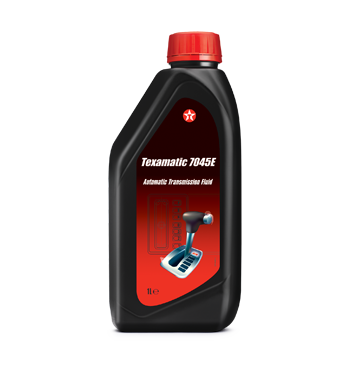Texamatic 7045E
Proven performance automatic transmission fluid

Texamatic 7045E is a proven performance automatic transmission fluid suitable for passenger car, light truck and bus transmissions requiring a GM DEXRON®-IIIG fluid.
- Texamatic 7045E is designed for use in the automatic transmissions of cars, light trucks and buses that require a GM DEXRON®-IIIG (GM 6417-M) type fluid. Although this specification has been made technically obsolete by GM itself, many equipment manufacturers continue to recommend fluids of this type
- Texamatic 7045E may be used in Ford passenger car transmissions that require a Ford MERCON®, M2C138-CJ or M2C166-H fluid. The product is not recommended for transmissions that require a Ford MERCON® V fluid (this is a separate specification to MERCON®). Due to fundamental differences in frictional properties, it should not be used in applications that require a Ford M2C33-F/G fluid
- Texamatic 7045E corresponds to BMW part number 83 22 0 026 922 “Texaco ETL 7045E”, the approved lubricant for a number of transmissions used in gasoline-powered models of the BMW 3 series (E46), BMW 5 series (E39) and Z3 (E36)
| Vehicle | Model | Transmission |
| BMW 3 Series (E46) | 323i/iS/iC/Ci 328i/iS/Ci |
GM 5L40-E (A5S 360R) |
| BMW 5 Series (E39) | 528 i/iT | GM 5L40-E (A5S 360R) |
| Z3 (E36) | 2.3i, 2.8i, coupe | GM THM-R1 (A4S 270R, A4S 310R) |
- Texamatic 7045E is also suitable for use in power steering systems that require a mineral-type Power Steering Fluid. It should not be used in steering or active suspension systems that call for specific semi-synthetic or synthetic fluids, as the response speed may not be sufficiently fast
- Texamatic 7045E may also be used as a wide temperature range anti-wear hydraulic fluid for mobile, industrial and marine applications. The viscosity corresponds to ISO VG 32
- Formulated with specially tuned friction characteristics to help provide smoother shifts and lock-ups
- Durable friction control designed to provide smooth operation throughout fluid service life
- High VI helps maintain fluid viscosity and transmission protection at high operating temperatures
- Low temperature fluidity improves wear protection during cold start-up
































